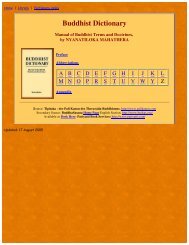The Three Basic Facts of Existence II: Suffering (Dukkha) - Buddhist ...
The Three Basic Facts of Existence II: Suffering (Dukkha) - Buddhist ...
The Three Basic Facts of Existence II: Suffering (Dukkha) - Buddhist ...
- No tags were found...
You also want an ePaper? Increase the reach of your titles
YUMPU automatically turns print PDFs into web optimized ePapers that Google loves.
Come, let us face it, just as honestly and as realistically as the Buddha did and admit that in allthe world we love ourselves the best. This verse occurs both in Saṃyutta-Nikāya I and in theUdāna:I visited all quarters with my mind,nor found I any dearer than myself;Likewise to self is every other dear;Who loves himself will never harm another.<strong>The</strong>re is a great deal <strong>of</strong> somewhat futile argumentation on the question <strong>of</strong> selfishness; whetherthe desire for Nibbāna is a selfish desire; whether the Arahat ideal is also selfish. <strong>The</strong> crucialpoint is that our motivations are always the same. Whatever we do—whether a man robs abank, or commits murder, or gives his life in defence <strong>of</strong> a principle, or becomes a monk andgives up the world—behind each and every one <strong>of</strong> these actions is the belief that it tends topromote the happiness <strong>of</strong> the individual so involved.This may appear shocking to some people who might well ask: “Is the teaching <strong>of</strong> theBuddha based on self-interest?” <strong>The</strong> answer is that it is. <strong>The</strong> most important aspect <strong>of</strong> theBuddha’s teaching is that it is based on enlightened self-interest. <strong>The</strong> search for happiness itselfis not wrong—only the delusion springing from ignorance as to how this happiness is to beobtained. To obtain happiness, or freedom from dukkha, is the seeming paradox <strong>of</strong> Buddhism.No one can be happy who still cherishes and hugs to himself the idea <strong>of</strong> separateness, <strong>of</strong>grasping at a personal private fulfilment.No one has given the subject <strong>of</strong> dukkha such pr<strong>of</strong>ound thought, and no one has analysed it sothoroughly as the Buddha. <strong>The</strong>re have been others who have realised that life is in essencesuffering; the author <strong>of</strong> Ecclesiastes summed it up as being, “Vanity <strong>of</strong> vanities, all is vanity.”<strong>The</strong> philosopher Schopenhauer also expounded dukkha with great insight. <strong>The</strong> modernexistentialists, too, are very thorough-going in their expositions <strong>of</strong> life being primarilyunsatisfactory and miserable. But none <strong>of</strong> these have <strong>of</strong>fered any solution. <strong>The</strong> author <strong>of</strong>Ecclesiastes <strong>of</strong>fers conflicting advice. In one place he tells the people, “Remember now thycreator in the days <strong>of</strong> thy youth,“ and elsewhere he says, “Be not righteous overmuch; neithermake thyself overwise. Why shouldst thou destroy thyself? Be not overmuch wicked, neither bethou foolish. Why shouldst thou die before thy time?” Throughout this harangue he modestlyclaims that “my wisdom remained with me.” A few paragraphs later he adds: “Yea, I hated allmy labour which I had taken under the sun, because I leave it unto the man that shall be afterme.” Apparently he was incapable <strong>of</strong> deriving any pleasure from the thought that someonewould benefit from his exertions, therefore we can very much doubt the extent <strong>of</strong> his vauntedwisdom. Neither Schopenhauer nor the existentialists counsel any line <strong>of</strong> action that is helpful.<strong>The</strong> Buddha however did not content himself with the bare statement that life was dukkha—healso <strong>of</strong>fered a way out <strong>of</strong> dukkha.Everyone who comes to a <strong>Buddhist</strong> Society, consciously or unconsciously, comes with theunspoken question: “What can Buddhism do for me?” We can tell you definitely, and it is betterto do so right from the beginning, that it cannot satisfy all your curiosity and all yourwonderings about the metaphysical questions about the baffling riddles <strong>of</strong> the universe. Tosome slight degree some <strong>of</strong> the questions can be answered by science. But science limits itself tothe study <strong>of</strong> phenomena, how they operate, and this knowledge enables the human race to usethe forces <strong>of</strong> nature to further our material welfare, thus making life more comfortable, and tosome extent, more secure. However, science cannot and does not attempt to find out the deus exmachina, the noumenon behind the phenomenon, nor can it define what man’s aspirationsshould be or provide him with a blueprint for happiness. It deals purely with the objectiveworld. <strong>The</strong> subjective world <strong>of</strong> man’s inner being is completely outside the sphere <strong>of</strong> science.28
















